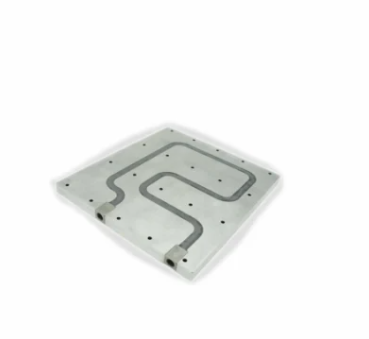- Time:2024/08/15 Posted:Dongguan Quality Innovation And Technology Co.,Ltd
Aluminum cooling plates have become a popular choice for radiators due to their efficiency, durability, and lightweight properties. Whether you’re working on automotive, industrial, or electronic cooling systems, understanding the key benefits of aluminum cooling plates and how to address common issues will help you make an informed decision.
Key Benefits of Aluminum Cooling Plates
1. Superior Heat Dissipation
- Benefit: Aluminum is known for its excellent thermal conductivity, which allows it to dissipate heat quickly and efficiently.
- Advantage: This ensures that your radiator effectively manages heat, preventing overheating and maintaining optimal performance in high-temperature environments.
2. Lightweight and Durable
- Benefit: Aluminum cooling plates are significantly lighter than other metals like copper, without compromising strength.
- Advantage: The reduced weight makes them easier to handle and install, especially in automotive applications where weight reduction is critical. Additionally, aluminum’s natural corrosion resistance adds to its durability, ensuring a longer lifespan.
3. Cost-Effective
- Benefit: Aluminum is more affordable than many other metals, offering a cost-effective solution without sacrificing quality.
- Advantage: This makes it an attractive option for large-scale production and applications where budget constraints are a factor, while still providing reliable performance.
4. Flexibility in Design
- Benefit: Aluminum can be easily fabricated into various shapes and sizes to fit specific radiator designs.
- Advantage: This flexibility allows for custom cooling solutions that meet the unique needs of different systems, from automotive engines to electronic components.
5. Eco-Friendly
- Benefit: Aluminum is 100% recyclable, making it an environmentally friendly choice.
- Advantage: Using aluminum cooling plates contributes to sustainability efforts, reducing waste and promoting the reuse of materials in manufacturing.

Solutions to Common Problems
1. Corrosion in Harsh Environments
- Problem: While aluminum is generally resistant to corrosion, exposure to certain chemicals or saltwater can lead to oxidation and pitting.
- Solution: To enhance corrosion resistance, consider anodizing the aluminum cooling plates or applying protective coatings. Regular maintenance and cleaning can also help prevent the buildup of corrosive materials.
2. Potential for Cracking Under Stress
- Problem: Aluminum, while strong, can be prone to cracking under extreme stress or improper installation.
- Solution: Ensure that the cooling plates are installed correctly, with even pressure distribution. In applications with high thermal expansion, allow for some flexibility in the design to accommodate temperature changes without causing stress fractures.
3. Heat Transfer Efficiency
- Problem: In some cases, the heat transfer efficiency of aluminum might be lower than that of copper, leading to concerns in high-performance applications.
- Solution: To maximize efficiency, pair aluminum cooling plates with high-performance coolants and ensure proper airflow within the radiator. The use of aluminum’s lightweight properties allows for larger surface areas, compensating for its slightly lower thermal conductivity compared to copper.
4. Electrochemical Corrosion
- Problem: When aluminum cooling plates are in contact with other metals, electrochemical corrosion can occur, especially in mixed-metal systems.
- Solution: To prevent galvanic corrosion, avoid direct contact between aluminum and other metals like copper. Use insulating materials or anti-corrosion coatings to separate different metals and reduce the risk of electrochemical reactions.
5. Manufacturing Defects
- Problem: Defects during manufacturing, such as uneven thickness or impurities in the material, can affect the performance of aluminum cooling plates.
- Solution: Source cooling plates from reputable manufacturers who adhere to strict quality control standards. Inspect the plates for uniformity and any signs of defects before installation.
Conclusion
Aluminum cooling plates offer a range of benefits, including superior heat dissipation, lightweight construction, and cost-effectiveness, making them an excellent choice for radiators in various applications. By addressing common issues like corrosion, cracking, and electrochemical reactions, you can ensure that your aluminum cooling plates deliver optimal performance and longevity. With the right selection and proper maintenance, these cooling plates can enhance the efficiency and reliability of your radiator system, contributing to the overall success of your cooling solution.
